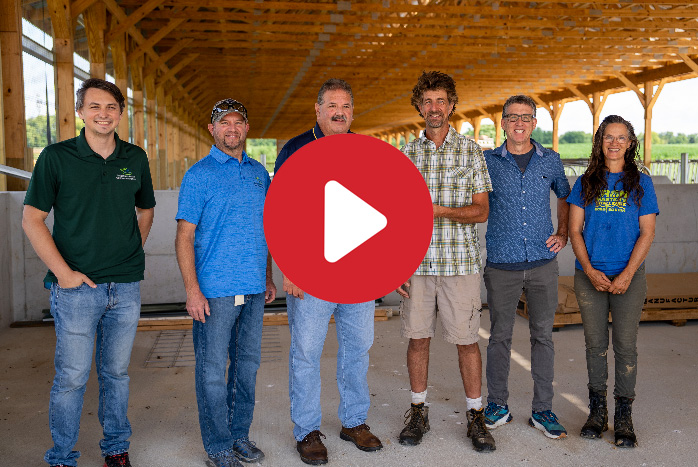Dickinson College Farm Receives $250,000 to Upgrade Biodigester System

College Farm.
Cumberland County Conservation District Awards Dickinson College Farm $250,000 Grant Supporting Innovative Sustainability Project
by Craig Layne
The Cumberland County Conservation District’s Conservation Excellence Grant Program has awarded $250,000 to the Dickinson College Farm. This grant will support the farm's pioneering anaerobic digester and manure management project, a system that transforms farm and food wastes into a sustainable source of electricity. Working with the neighboring Triple L Farm dairy, the project will also reduce water pollution to a local stream and the Chesapeake Bay.
“We will be the only college farm in the northeast to be a net exporter of energy,” says Matt Steiman, the Dickinson College Farm's energy & livestock manager. “We’re really grateful for the support of the Cumberland County Conservation District to make this project possible,” he adds. Conservation Excellence Grant funds are specifically dedicated to replacing an old leaky dairy cattle pen with a state-of-the-art roofed heavy-use area for manure collection, as well as a manure pumping system and associated pipes.
Food waste and manure are fed into the anerobic digester, a two-building complex being constructed on the farm. The process creates biogas, which can be used for cooking, heating and generating electricity. Steiman says the new digester will process the manure from the neighbor’s 150 dairy cows plus two tons of food waste every day.
Keeping the manure off the ground and out of local waterways is especially helpful for the environment says Cumberland County Conservation District Manager Carl Goshorn. “It’s important because we’re right next to the Yellow Breeches, a high-quality stream right here in Cumberland County,” he explains. “It’s a great fishery. This will help keep the soil in place and nutrients on the farm where it should be and not in the stream.”
As for the food waste, that will come not only from the Dickinson Dining Hall but also from local restaurants and other partners, including spent brewer’s grain from the Molly Pitcher Brewing Company. The biogas from the digester will then generate about 200,000 to 300,000 kWh per year of renewable electricity. The farm can use that electricity to power its operations and sell some back to the grid. The project will also produce a recycled fiber bedding material for the dairy farm.
Dickinson has long been committed to sustainability across its campus and curriculum, and has been diverting food waste from landfills to the farm since 2008, when the college launched a composting project with scraps from the Dining Hall. Alongside the compost program, the farm began experimenting with small-scale biogas digesters more than a decade ago. This work ramped up in 2020 with the initiation of the farm-scale digester project, in partnership with neighboring Triple L Farm.
The farm has already secured more than $1.3 million in funding for the digester. Recently, The GIANT Company and Keep Pennsylvania Beautiful awarded the project a $20,000 grant. Additional support has come from the USDA Natural Resource Conservation Service, the U.S. Environmental Protection Agency, the Met-Ed Sustainable Energy Fund, Constellation Energy, the Pennsylvania Department of Agriculture, the Pennsylvania Department of Environmental Protection, High Tide Foundation, Cumberland County Conservation District and the South Mountain Partnership.
TAKE THE NEXT STEPS
Published July 26, 2023